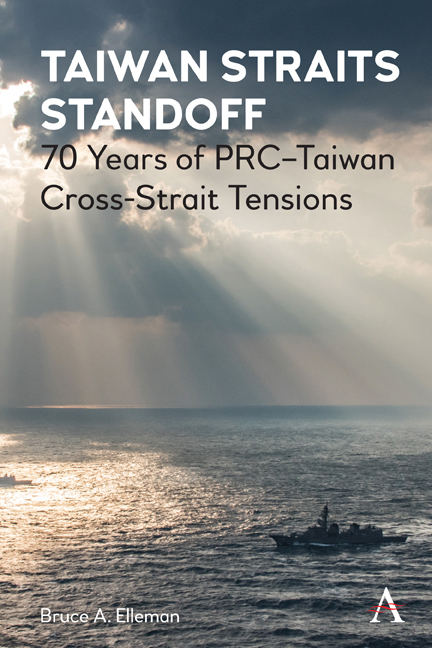Book contents
- Frontmatter
- Dedication
- Contents
- List of Illustrations
- Introduction: Stalemate along the Taiwan Straits, 1949–2020
- 1 The Two Chinas and the Battle for Control of Offshore Islands
- 2 President Harry S. Truman’s Decision to Protect Taiwan
- 3 The First Taiwan Strait Crisis, 1954–55
- 4 The Evacuation of the Dachen Islands, 1955
- 5 The Second Taiwan Strait Crisis, 1958
- 6 The US Threat to Use Atomic Weapons
- 7 Using Taiwan to Undermine the Sino-Soviet Alliance
- 8 Taiwan during the Cold War and Afterward
- Conclusions: The Taiwan Strait’s Strategic Significance Today
- Appendix: Naval Terms and Acronym List
- Selected Bibliography
- Index
3 - The First Taiwan Strait Crisis, 1954–55
- Frontmatter
- Dedication
- Contents
- List of Illustrations
- Introduction: Stalemate along the Taiwan Straits, 1949–2020
- 1 The Two Chinas and the Battle for Control of Offshore Islands
- 2 President Harry S. Truman’s Decision to Protect Taiwan
- 3 The First Taiwan Strait Crisis, 1954–55
- 4 The Evacuation of the Dachen Islands, 1955
- 5 The Second Taiwan Strait Crisis, 1958
- 6 The US Threat to Use Atomic Weapons
- 7 Using Taiwan to Undermine the Sino-Soviet Alliance
- 8 Taiwan during the Cold War and Afterward
- Conclusions: The Taiwan Strait’s Strategic Significance Today
- Appendix: Naval Terms and Acronym List
- Selected Bibliography
- Index
Summary
By the summer of 1953, the Korean conflict stalemated. Stalin's death on March 5, 1953, helped break the negotiating deadlock. The Korean armistice was finally signed on July 27, 1953. Military pressure from the south, directed from Taiwan by means of the offshore islands, was crucial for bringing about the armistice. Soon afterward, the PRC began to redeploy troops from north to south. Tensions gradually grew throughout the south, particularly in the Taiwan Strait region. Soon after the first crisis ended, Secretary of State Dulles describing it as equivalent to “living over a volcano.”
On August 11, 1954, Zhou Enlai declared that the PRC must liberate Taiwan. On September 3, 1954, PLA forces began to bombard the offshore islands of Jinmen and Mazu. This renewed focus on reclaiming the offshore islands by force showed Mao Zedong's independence from Moscow. Another important PRC goal was to interrupt the Nationalist blockade. During November 1954, PRC leaders had explained to Jawaharlal Nehru, the visiting Indian Prime Minister, that the Nationalists from their offshore bases were conducting “nuisance raids and interference with shipping.” Upon his return, Nehru met with the British High Commissioner in India to warn him that China was “determined not to tolerate this situation any longer.”
The shelling of Jinmen and Mazu was also used as a cover to attack other Nationalist-controlled islands, in particular the most northerly of the Nationalist-held offshore island groups, the Dachens. In this overcharged political climate, the US government signed a security pact with Taiwan plus, later in January 1955, proclaimed the Formosa Resolution. After convincing Chiang Kai-shek to evacuate the Dachens, the USN provided the ships, training, and protection during the evacuation operations. This limited the Nationalist-controlled offshore islands to a much smaller area that encompassed Jinmen to the south and Mazu to the north.
The beginning of the 1954–55 Taiwan Strait crisis
Tensions over the offshore islands led to a crisis during fall 1954. In August 1954, Chiang Kai-shek had ordered additional deployments to Jinmen and Mazu. These actions had all of the outward appearances of supporting a future Nationalist invasion of mainland China. Certainly, the PRC leaders were sufficiently concerned to authorize PLA attacks against the Nationalistheld offshore islands, and in particular the northernmost islands of Yichiang and the Dachens.
- Type
- Chapter
- Information
- Taiwan Straits Standoff70 Years of PRC–Taiwan Cross-Strait Tensions, pp. 43 - 64Publisher: Anthem PressFirst published in: 2021

